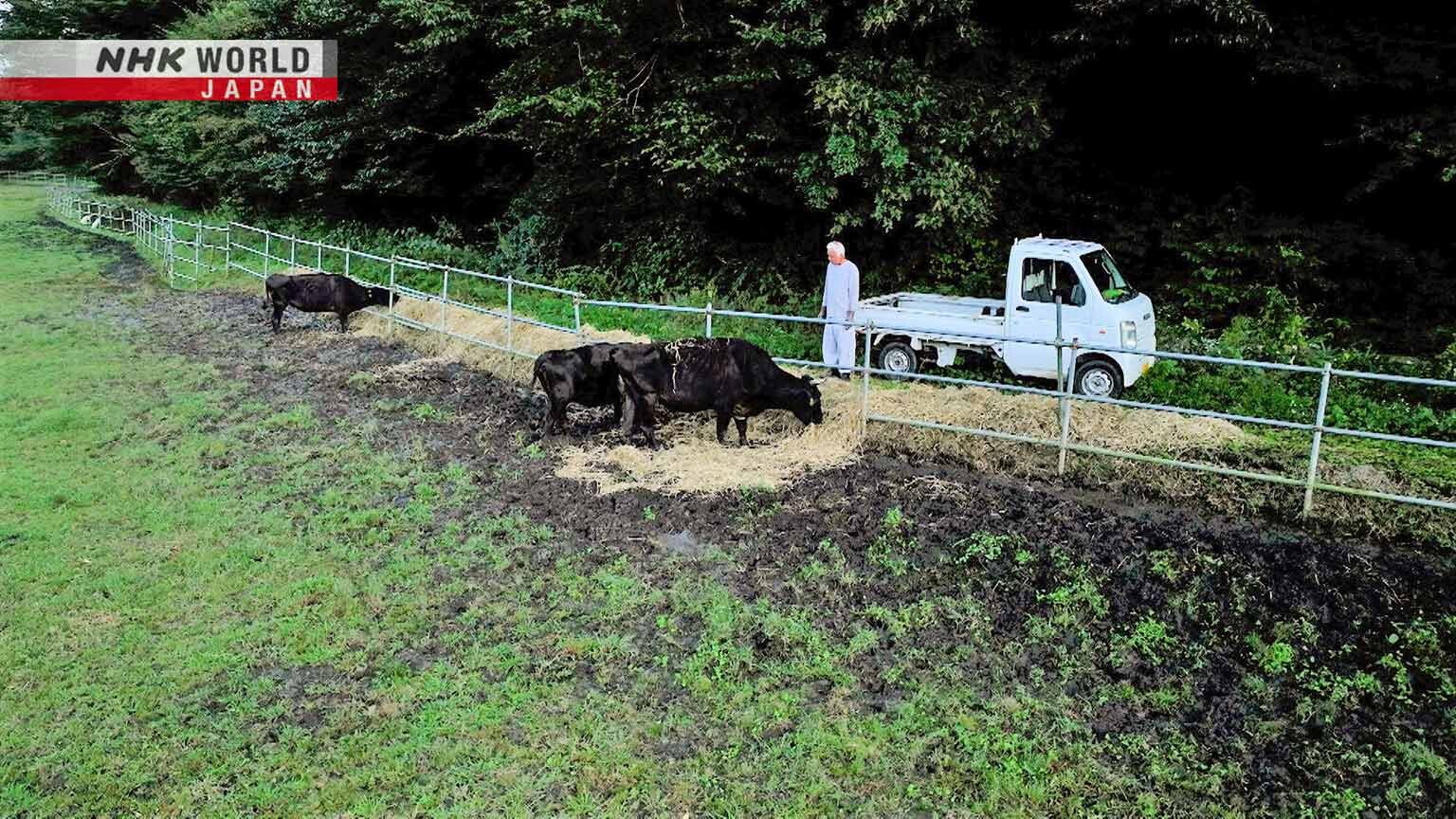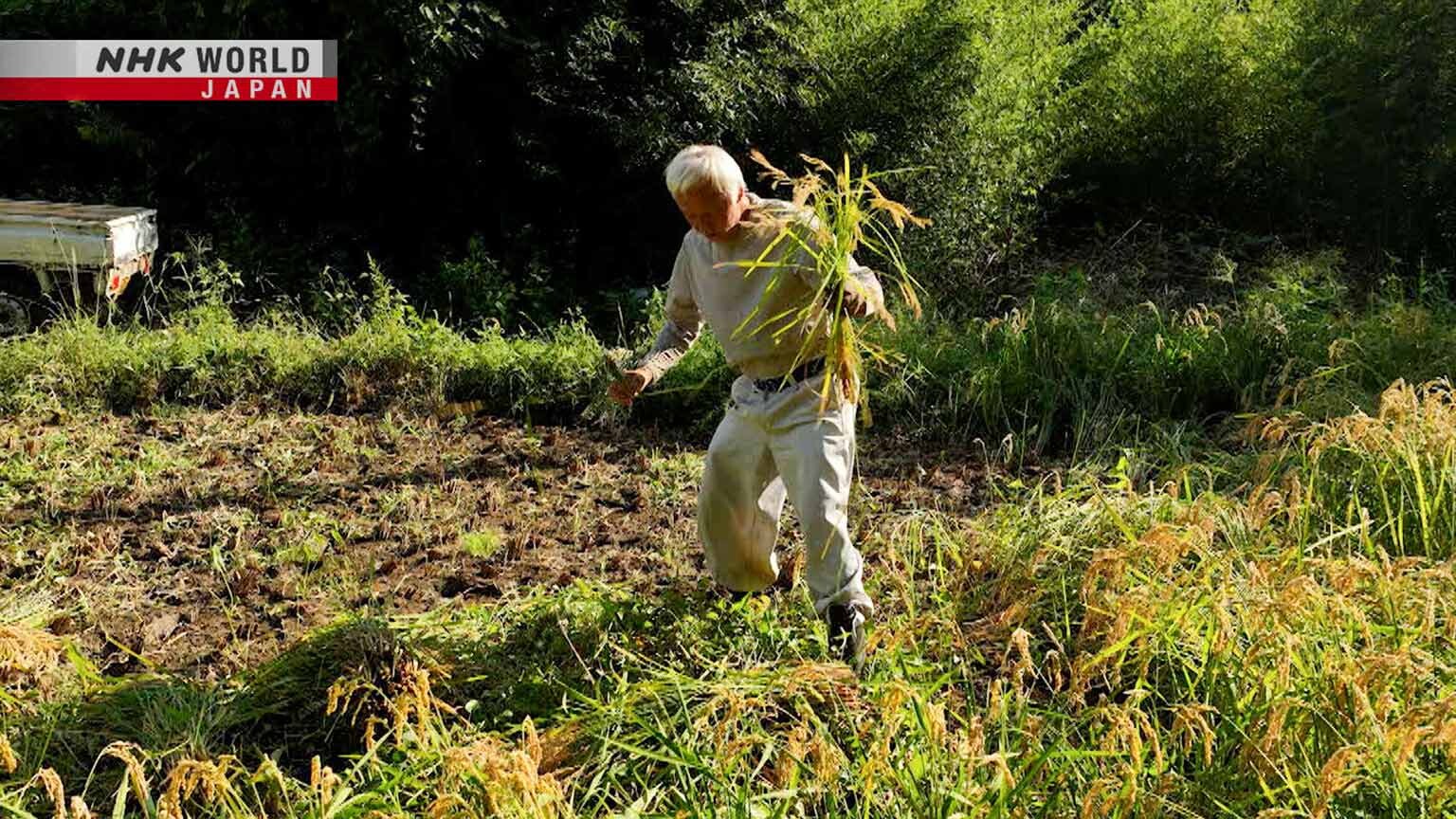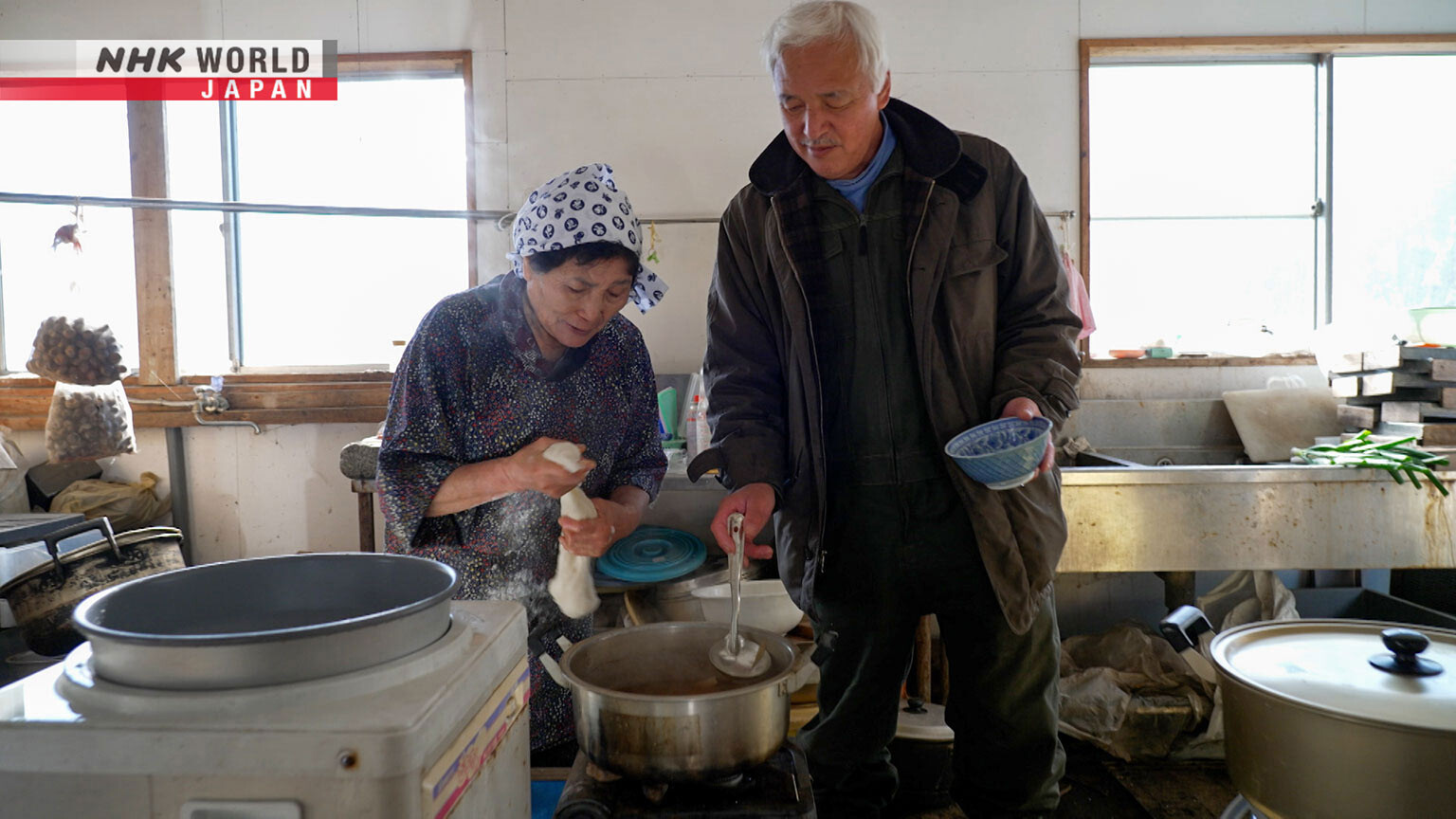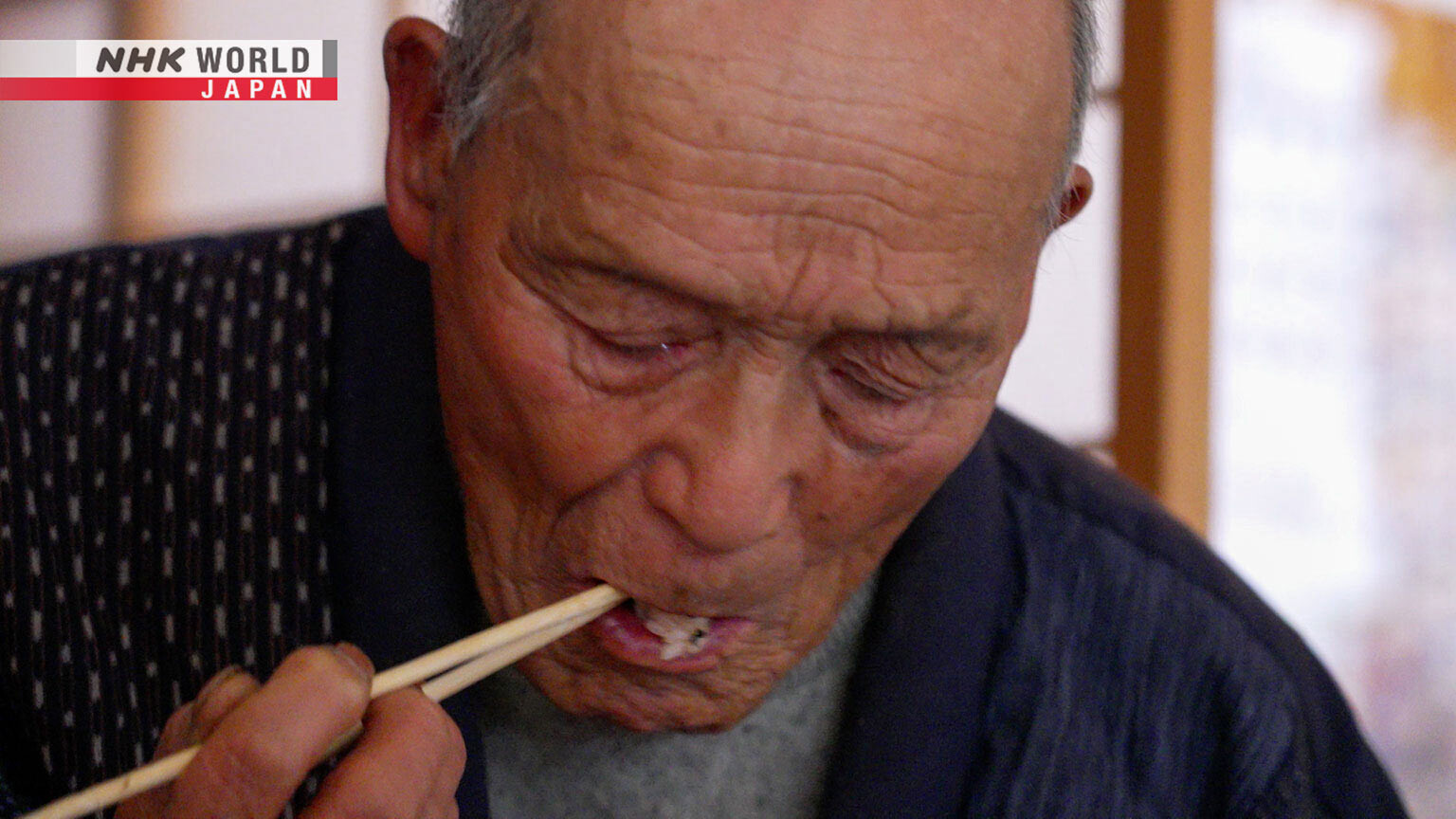Fukushima Monologue III
After Tomioka's evacuation order was lifted, the few returnees were mostly elderly. To raise their spirits, Matsumura grows rice from which he can make mochi, a traditional favorite on special days.




Transcript
After twelve years, Tomioka's autumn festival has finally returned.
This town, where I live, is less than 15 kilometers from the Fukushima Daiichi Nuclear Power Plant--
the site of the notorious accident in 2011.
Now that the evacuation order has been lifted for most of Tomioka, some residents are trickling back.
But most are in their 60s, like me, or even older.
The town is completely different.
"What used to be over there, in that vacant land?"
There was a shopping district. All along here.
Now there's nothing. No shops.
No trace at all. Just vacant land.
The festival may be back -- but it's nowhere near as lively and crowded as it once was.
There used to be so many kids. Loads of them.
- "And you were one of them?"
- Yeah.
Even though twelve years have passed since the disaster,
Tomioka is far from the town I imagined it would be. But I won't give up.
After the evacuation order was issued in March 2011, lots of animals were left stranded in Tomioka.
I stayed behind alone, collecting donations, so I could feed them and keep them alive.
Altogether, I looked after more than 350 animals, including livestock and pets.
The farmland around here has been neglected for over a decade.
But for the past couple years, I've been trying to restore some of it.
I felt I simply had to try my hand at farming for the sake of my ancestors who cultivated this land.
I'm going to grow mochi rice.
Around here, no traditional celebration is complete without dishes featuring sticky rice.
It's hard to imagine this was a rice paddy.
No one else would want to turn it back into a field.
It's so overgrown.
I'm seeing this field for the first time in 12 years.
I can't believe it.
- "Those solar panels?"
- That was a field.
After the disaster, the fields ran wild.
My family came here from the snow country over a hundred years ago.
My ancestors put in a lot of hard work to carve out a life.
The disaster was devastating, but I don't want their efforts to have been in vain.
To make a bit of money, I started beekeeping.
I was actually one of the people involved in constructing the nuclear power plant.
But since the disaster, I've been rebuilding my life around the blessings of nature.
Restoring farmland that's been running wild for 12 years is no easy task.
But I'll see it through.
That's just who I am.
- "Can this become a field again?"
- I'll do it.
If I decide to do something, I will.
- "So not "can," but..."
- "Will."
If you question whether you can, it won't happen.
Most people would just give up.
Not "can" but "will."
You mustn't be half-hearted. You'll just end up quitting.
After five days of work, I finally have a field.
During a break, I'm enjoying a local treat made by my father's cousin, who lives in a neighboring town.
Simmered bamboo shoots.
A crunchy and delicious seasonal delicacy.
This is one of the best things about life in the countryside.
Sharing home-cooked food.
And people who know the old ways prepare especially good food.
Here's that relative.
Sakuko's in her eighties.
Her town, too, had an evacuation order.
After spending time in seven temporary facilities, she finally made it home.
My parents had to evacuate, and both of them ended up dying.
Sakuko is now the only relative I can turn to around here.
There are so many.
She grows ume -- Japanese plums -- and there's a good crop this year.
She's going to show me the best way to pickle them.
Cup of tea?
She's an amazing cook.
She knows hundreds of recipes that make the most of seasonal ingredients.
I'm no chef, but I want to preserve those recipes, so sometimes I visit her to get a cooking lesson.
Honest-to-goodness local cuisine.
I think food like this actually builds community identity and morale.
Add 500 grams of salt to 3 kilograms of ume.
Mix it in.
This is my own recipe.
Like this.
Boil red shiso to release the color.
Bring it to a gentle simmer.
- So you let it boil again?
- Briefly. Yes.
OK, it's boiling. See?
That's when I add the vinegar.
- You eyeball the amount?
- Yes.
Pour it around. Like this.
Then turn off the heat?
- Enough to immerse them?
- Right.
That's enough.
Pack the ume in the liquid, and the fruit will turn red.
Evacuees must love getting this taste of home.
Yes, they do.
Very few people now make local dishes, so they're vanishing.
I'd cook for all the evacuees, but I'm too old.
We used to share our miso with nieces, uncles, and aunts.
They'd come over with buckets.
Relatives would look forward to getting our miso and rice.
On special occasions. That's how it was.
They'd leave with overflowing buckets.
I've lost touch with relatives.
I don't see my cousins anymore.
They evacuated, and I don't know where they went.
My cousins are gone.
I'd love to be with them, but I'm already 84!
How long do I have?
Until you die.
It's time to plant mochi rice in the field that I battled to clear.
It's almost unbelievable. This used to look like a jungle.
Now it's a proper rice field!
It's looking good.
Anything is possible.
Just put your mind to it.
There they are! I want them to come over here.
A summer festival with 400 years of history is returning.
Participants light torches and pray for a good harvest.
But the organizing association has undergone a big change.
We have 30 to 40 torch bearers.
How many of your members have moved back to Tomioka?
None. Not one person.
We evacuated and only come back for the festival.
A thousand lights!
Harvest prayers have returned, but farming itself has changed.
Rather than restore their fields, many farmers lease them to solar firms.
Lots of people have abandoned farming.
But I've actually taken it up.
Why? Because working the land has always been the cornerstone of community.
People say "reconstruction," but I want to rebuild human bonds--by sharing what I grow.
Grow mochi rice, make food, share it. That's it.
In the past, mochi rice was key to New Year's celebrations.
Walk down the street, and you'd be invited in for tea.
Life wasn't easy, so we helped each other. That's human nature.
I wanted to make some money from the hives.
But the bees have been wiped out by invaders.
Here's one of the culprits.
- "Hornets attacked the bees?"
- Yeah. Several times.
The black things are dead bees.
- "They look burnt."
- They're just old and rotten.
Hornets massacre them.
They cause so much damage.
Hornets will kill any number of bees.
- "Why?"
- To eat the larvae.
Bees fight to the death.
But they simply can't win.
It's brave of them to try.
They just have to.
Fight to the end.
They lose either way.
See that skill?
I've got a bit of a problem at the rice field I worked so hard to clear.
If a typhoon comes, they'll be flattened.
Nothing's been grown here for over a decade,
so the soil is packed with goodness, and the stalks have grown too tall.
Some of them have fallen over.
If I don't do something, I won't be able to harvest the rice.
I need to use sticks to keep the stalks upright.
Any amount of rice is okay.
I'm determined to make at least some mochi dishes, so I can share them.
After the evacuation order was lifted, mostly old people came back.
Younger evacuees had already built a new life for themselves elsewhere.
When Hangai-san evacuated, I looked after his pony and his 30 cows.
He's back now, but he misses his old friends.
I think folks like him would enjoy traditional food, a reminder of days gone by.
Nobody can make it alone.
We have to help and be helped.
We all need friends and companions.
People we can turn to in times of need.
Caring for each other makes us stronger.
Tomioka's population is about 2,000. One-seventh of what it once was.
Please welcome the 3-5 year olds!
First, the Sakura Class.
It's Sports Day at the only preschool in town.
Most parents are newcomers with links to reconstruction.
Ready, set, go!
New residents now outnumber returnees.
It's becoming a new community with new people.
They settle down here. They have kids.
It will be their home.
In a century, maybe there will be as many people as before.
We locals only have a few more useful years left in us.
These kids are the future of this town.
The animals I've been taking care of are dying off as well.
At one time, I had 60 cows. Only three remain.
For years, I looked after Hangai-san's pony, Yama.
He's gone now, too.
I buried him over there.
- "You did that yourself?"
- Yes.
- "What was he like at the end?"
- Same as always.
Except with the cows. He started giving way to them.
When I used to feed them, he'd kick at them.
But he stopped.
He didn't have it in him.
I hadn't visited Hangai-san in a while, so I took him some white rice, freshly harvested from one of my other fields.
Hello? I'm coming in.
Wait! The cat'll run off!
The cat will get out. I'll shut it in here.
That was a shock!
It tries to get out.
I brought some rice for you.
Oh, thanks.
Harvested five days ago, and gradually dried.
This is good stuff.
The bad grains have been removed.
- No bad grains.
- None.
- First class.
- First class!
And no agrochemicals.
I used to eat so much.
Nowadays I don't.
I've been told people eat less when they get older.
And it's true. I don't really get hungry.
I'm still working hard. Maybe my digestion's bad.
Or your stomach's shrunk.
Hangai-san adored Yama.
The pony's death hit him hard.
I'd call his name, and he'd come over.
I think he was attached to me.
He was so cute.
We were happy.
I hear he hid himself away at the end.
Matsumura said "get up," but he couldn't.
- "Matsumura looked after Yama."
- Yes, until the end.
Thankfully, some of my mochi rice is harvestable.
I planted it because I wanted to make food for the people who've come back.
As the yield is small, I want to thresh it myself.
So I'm borrowing an old thresher from Sakuko.
I can manage this.
- "How old is this thresher?"
- No idea.
- 100 years old?
- No, I used it when I was small.
We threshed rice outside.
No year written anywhere.
I got married in 1961. We'd stopped using it by then.
After so many years collecting dust, it needs a bit of attention.
I have hataimo.
The TV crew might not want any.
- Tokyo folk don't eat it?
- No idea.
Let's ask. Want some hataimo? It's like taro.
Sakuko just loves sharing her home-grown produce.
And whenever she has visitors, she'll serve up something delicious.
With miso. Enjoy.
It's homemade miso.
Tuck in.
Have some tea.
Delicious.
Just like the old days.
After spring planting, we'd have leftover taro.
We'd boil them, then peel them by hand.
And we'd serve them with sansho miso, like this.
This is the kind of friendly interaction I grew up with, and it's exactly what I don't want us to lose.
Solar panels now cover more than 100 hectares of what used to be farmland.
It's accelerating the loss of human connection.
It really gets me down.
I don't know if this ancient thresher will be of any use.
But I'm going to try and fix it anyway.
The new screws look a bit out of place.
People will laugh at this ancient contraption!
Got to be careful. Might break it.
These days people just throw stuff away.
One little problem and that's it.
We used to fix things when they were broken.
Now, when something breaks, people just replace it.
I have threshed the rice, so I can finally make some mochi rice cakes.
Around 30 minutes?
- "What's that?"
- Steamer.
"Making mochi is tough."
Only when I take it out.
The machine does everything for me.
But lifting the mochi out at the end is tough.
I haven't got the strength. My age has caught up with me.
Tea?
See what I mean? I'll make some tea.
This stuff is dangerous. I'll burn it later.
OK.
Put it down. It's hot.
Hold out your hand. It's really tasty.
You want some?
- "I'll have some later."
- Later it'll be real mochi!
Making mochi is fun.
- It's rotating!
- That's no good!
Round and round it goes.
You wet your hands, grab it, and haul it out.
By doing things like this, we built family and community.
Then you go like this.
Pound it to get the air out.
Every family made mochi for New Year's.
My mother started at 3 or 4 in the morning.
Then she'd hand it out.
People loved it. Fresh mochi's so good!
After the accident, this vanished.
It's hot! It's sticking!
Cover your hands in flour.
Like this? More?
Ah, why is it so sticky?! It's everywhere.
Do it like this.
How many? Two, three, four.
Daikon mochi.
- Good?
- Great!
- That good?
- Yeah. Freshly made!
OK, let me try some of the mochi that you made.
Mmm, it's good.
- "Did it turn out well?"
- It certainly did.
- "What score will you give it?"
- 100!
Stop making me laugh!
It'll get stuck in my throat!
- It's perfect.
- Very good.
Come on, everyone, try some!
While it's still fresh.
Since the nuclear accident, I've looked after animals, and I've tried to bring back some old ways of life.
How long can I keep going?
It's been nearly 13 years.
And for the first time since the accident, I'm celebrating the new year with mochi that I made myself.
With thanks.
It's good.
Sometimes, elderly people do choke on mochi.
So for Hangai-san, I'm using mochi rice to make sekihan.
That's rice with beans.
- What's this?
- Sekihan.
I brought sekihan. And a bit of mochi.
- You made it?!
- Yeah, earlier today.
It's warm!
He's brought homemade sekihan.
- Really?
- It's still warm.
I can't stay long. I have so much to do today.
Go ahead, try some.
Oh, good job!
It's been so long!
- First time since the disaster!
- No one makes it anymore.
I'm impressed!
It's nothing. I'm happy to share.
We often ate sekihan. To mark a birth and so on.
But not many kids are here now. Not since the disaster.
So I haven't eaten it.
This is the first time since.
There's no one here anymore. No neighbors.
No one to celebrate with.
When you give him the mochi, watch out he doesn't choke!
- He'll be fine.
- Yeah, fine.
Well, then. Happy New Year.
- Same to you.
- Thank you very much.
"Thank you. All the best!"
The 13th anniversary of the Great East Japan Earthquake and Tsunami.
That day has come again.
As it does every year.
We will soon mark the time of the disaster.
It feels like yesterday.
Since then, we've had big earthquakes in Kyushu and Noto.
It's always been this way.
Disaster can happen to anyone.
You just have to cope.
That can be hard. But rewarding, too.
No matter what, cherry blossoms bloom every year.
No matter what, we keep living.
It's how we lived that counts.
Fukushima Monologue Ⅲ.